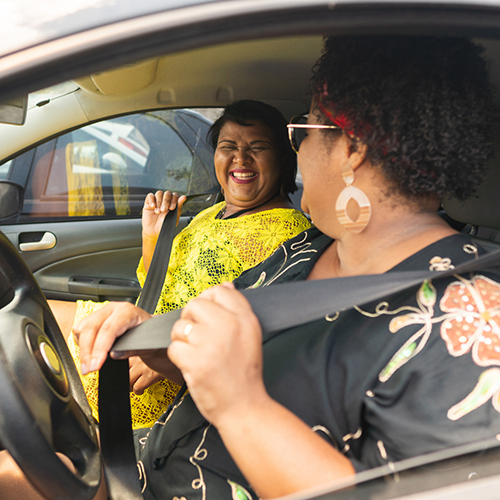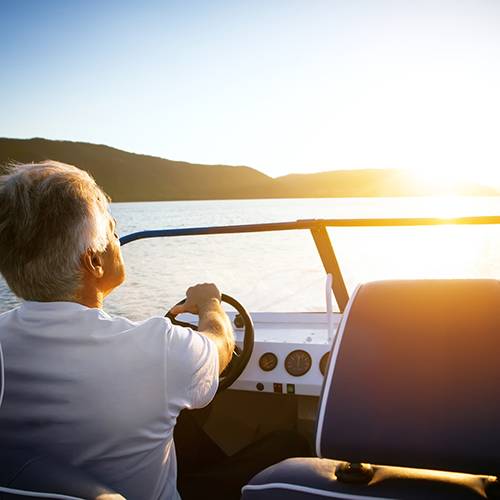A Comprehensive Guide for a Safer, Cleaner Road Trip

Pack your bags - it's time for a road trip! Whether you're driving down the shore, across the country, or to grandma's house, you'll need to plan for a hitch-free trip. From fuel efficiency to travel safety, NJM has your back with tips to make your trip successful.
Improving Your Gas Mileage
There are a lot of reasons to worry about gas mileage when planning your trip. Maybe you're concerned with gas prices, maybe you want to reduce your environmental impact, or maybe you just want to make as few pit stops as possible between home and your destination. Whatever your reason, you want to increase your gas mileage. Here are some tips for becoming fuel efficient:
-
Ease off on the gas pedal. Accelerating rapidly is not only dangerous - it can also waste gas. In fact, aggressive acceleration and hard braking can lower your gas mileage by between 10% and 40%.
-
Slow down. Fuel economy decreases when you travel above 50 miles per hour. According to the U.S. Department of Energy, for every 5 miles per hour you travel above 50, you pay $0.19 more per gallon for gas. Use cruise control to keep a constant speed on the highway and save gas.
-
Stow your stuff in the trunk. Attaching cargo boxes or other accessories to your car's exterior increases aerodynamic drag. Save on gas prices by removing these extra features when you don't need them.
-
Lighten up. When your car carries too much weight, it requires more energy to move, especially in smaller vehicles. Remove any items you won't need for your trip.
-
Don't idle. If you're stopping for longer than a minute, turn off your engine while you wait. The U.S. Department of Energy recommends limiting your engine starts to ten per day and driving at least five miles after starting to recharge the battery.
-
Check your tires. Low tire pressure can increase resistance, making your car burn more fuel. Regularly check your tire pressure and have your tires rotated.
-
Know when to use A/C. When traveling below 60 miles per hour, turn off the air conditioning and open the windows. Not only will this help to cool down your engine, it'll also help save gas. There is a catch, though: when traveling above 60 mph, opened windows increase drag and, as a result, gas usage. At higher speeds, close the windows and resort to using the A/C if necessary.
Keeping the Roads Clean
Improving your gas mileage isn't the only thing you can do to reduce your impact on the environment this summer. Keep these tips in mind as you travel:
-
Pack light. As stated above, vehicles use more energy when they carry more weight. And so do you! Conserve your and your car's energy by packing light.
-
Leave no trace. Whether you're going to a national park or an amusement park, leave the place better than you found it. Clean up after yourself and, of course, don't litter.
-
Reduce and reuse. Bring reusable water bottles with you. This will keep plastic out of landfills and also reduce the cost of your trip, since you won't need to purchase expensive bottled water from vendors.
-
Stay in one place longer. Visiting multiple locations while you have a few precious days off work can seem ideal, but it can also require you to use more gas. Consider destinations where you can stay in one location and take short day trips to closer attractions.
-
Take public transportation. Instead of driving, look into bus or train schedules. If you're traveling to a metropolitan area, look up the public transportation options beforehand. Within those cities, also consider clean options like biking.
-
Take direct flights. Because airplanes require so much fuel to take off and land, it's more environmentally friendly to take a direct flight than a layover.
Staying Safe While Traveling
Driving long distances comes with many risks. To reduce the risk of an accident during your road trip, keep these tips in mind:
-
Never leave your children or pets in the car for any amount of time. During the summer, cars warm up to dangerous temperatures.
-
If your vehicle breaks down, find a safe place to pull over and follow our breakdown safety tips. NJM Roadside Assistance has you covered anywhere in the United States or Canada for emergency towing, lockout service, jumpstarts, flat tire changes, and gasoline delivery.
-
Stay alert while driving and take frequent breaks. Drowsy driving causes up to 1.2 million crashes each year.
-
Avoid distracted driving. Prepare for your drive beforehand: put the pets and the phone in the back seat so they don't distract you.
Making Sure You're Covered for Your Road Trip
Your auto insurance policy will cover you when you travel to other states. Just keep these tips in mind:
-
Keep your insurance identification card in the car.
-
You might decide to rent a car to reduce the mileage on your personal vehicle. But what should you do about rental insurance? Check your auto policy to see what's already covered under your policy.
-
If you get into an accident while traveling, will you be covered for an emergency rental? Check to see if your policy includes rental reimbursement.
With NJM Auto Insurance, you receive among the best customer service in the country. Receive worldwide personal property protection and save on your insurance premium when you bundle your auto and homeowners policies. Get a quote.



